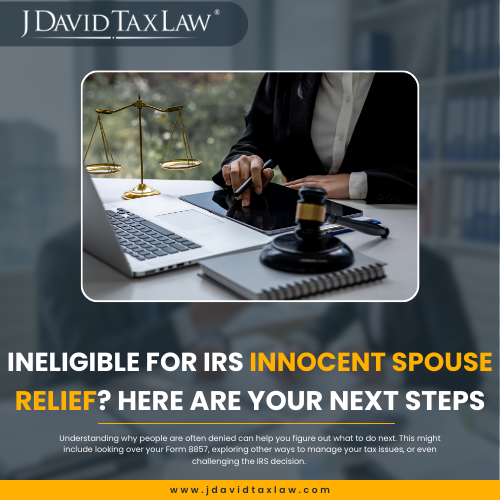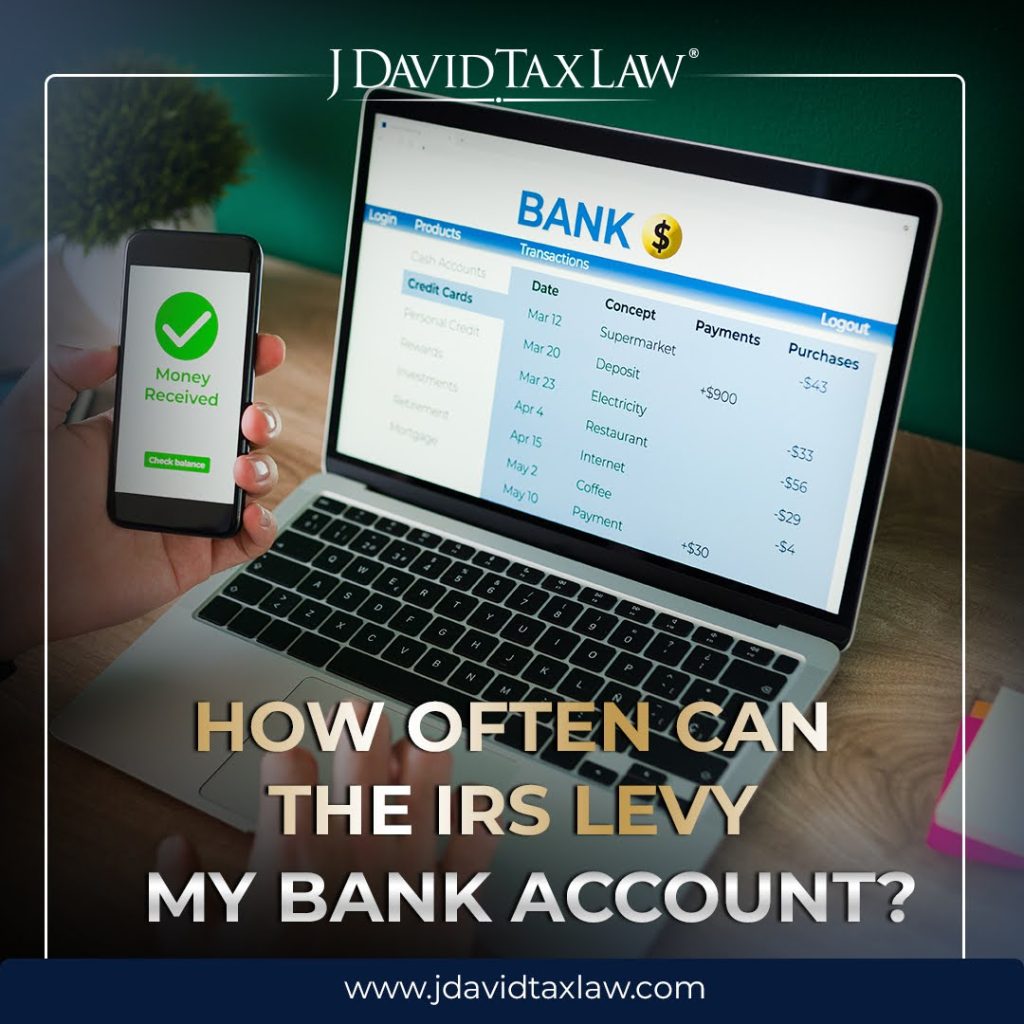- Home
- About Us
- IRS Calculator
- Services

Tax Debt Solutions

Specialized Tax Services

IRS Enforcement Actions

Tax Filing & Compliance

IRS Disputes & Audits
- Locations
- Contact Us
Call for Free Consultation

Tax Debt Solutions

Specialized Tax Services

IRS Enforcement Actions

Tax Filing & Compliance

IRS Disputes & Audits
Call for Free Consultation
Secure relief from married joint tax liabilities with help from our experienced Innocent Spouse Relief attorneys.
Find Out If You Qualify for Tax Relief in 4 Easy Steps!
Check Your Eligibility for Tax Settlement Today!
IRS Innocent Spouse Relief protects you from being unfairly charged for tax mistakes made by your spouse on a joint return. You have three options: Standard Innocent Spouse Relief, Separation of Liability Relief, and Equitable Relief, each tailored to different situations. Acting quickly to secure the right relief can help avoid serious consequences like wage garnishment, tax levies, and federal liens, ensuring your finances are protected.

If your spouse made tax mistakes, you shouldn’t have to pay the price. Yet every year, thousands of taxpayers are blindsided by IRS debt caused by a current or former spouse—debts they didn’t create and didn’t know about. This is addressed through a legal provision known as Innocent Spouse Relief. This IRS program allows you to legally separate yourself from joint tax liability tied to your spouse’s errors—such as unreported income, inflated deductions, or fraud on a joint tax return.
Our attorneys have successfully resolved complex Innocent Spouse Relief cases nationwide, including those involving prior denials, high-dollar liabilities, and urgent collection threats. With over 40 years of collective experience, we’ve earned the trust of clients in all 50 states, including high-stakes cases in California, Maryland, and New York. Our firm is A+ BBB accredited, backed by over 1,000 five-star reviews, and honored with awards.
You must meet specific criteria before you can qualify. According to IRS Publication 971, you may be eligible for Innocent Spouse Relief if all of the following are true:

How Our Service Simplifies Innocent Spouse Tax Relief

We Start with free initial consultation to explore your options for Innocent Spouse Relief.


Our tax attorneys guide you through a clear and effective process to file IRS Form 8857 correctly and secure Innocent Spouse Relief with confidence.

Once we prepare and submit Form 8857, we actively engage with the IRS, presenting a compelling case that highlights why holding you responsible would be unjust.

Our tax specialists assist in accurately addressing any compliance issues, ensuring that all tax filings are correct and timely, and that any outstanding obligations are properly managed.

We Start with free initial consultation to explore your options for Innocent Spouse Relief.



Our tax attorneys guide you through a clear and effective process to file IRS Form 8857 correctly and secure Innocent Spouse Relief with confidence.

Once we prepare and submit Form 8857, we actively engage with the IRS, presenting a compelling case that highlights why holding you responsible would be unjust.



Our tax specialists assist in accurately addressing any compliance issues, ensuring that all tax filings are correct and timely, and that any outstanding obligations are properly managed.

We offer expert relief to help you stop tax debts caused by your significant other and reclaim your financial stability.
Innocent Spouse Relief is not a courtesy extended by the IRS—it is a legal request that must be supported by facts, documents, and a compelling argument. The burden of proof is on the applicant. If the claim lacks legal clarity or fails to meet IRS fairness standards, it is denied, and collection efforts often continue without delay. The result can be wage garnishment, liens, or IRS enforcement actions you never expected.
We also represent clients in appeals and ensure their rights are protected throughout the process—especially in cases where Form 8857 has already been denied. Our tax specialists assist in accurately addressing any compliance issues, ensuring that all tax filings are correct and timely, and that any outstanding obligations are properly managed.
Discover the 5-star experience that keeps our clients coming back—
If you do not qualify for Innocent Spouse Relief, you may still have other options to avoid or mitigate the tax liabilities arising from a spouse’s tax issues. Here are a few alternatives to consider:
Equitable Relief IRS is an option for those who don’t qualify for innocent spouse relief under Section 6015. The IRS may grant this relief when it would be unfair to
hold you responsible for unpaid taxes or a tax deficiency. To qualify, you must file a joint tax return and meet specific deadlines: 10 years after the tax is assessed or within 3 years after the return is filed or 2 years after payment.
Additionally, no fraudulent transfer of assets between spouses should have occurred, and the tax debt must be related to the other spouse’s tax items. This relief is detailed in Form 8857 and IRS Publication 971.
Separation of Liability Relief under Section 6015(c) is another tax relief option for those who don’t qualify for innocent spouse relief. It allows taxpayers to divide
Injured Spouse Relief allows a taxpayer to reclaim their share of a refund if it was used to cover their spouse’s past debts, such as unpaid taxes, student loans, or child support.
An innocent spouse is a person who can be relieved from paying taxes, interest, or penalties if their spouse or former spouse improperly reported or omitted items on their joint tax return. The IRS provides this relief when the innocent spouse can prove they were unaware of the errors and did not benefit from them. This relief aims to protect individuals from being unfairly held responsible for their spouse’s tax mistakes.
Innocent Spouse Relief is a provision by the IRS that allows a taxpayer to be relieved from the responsibility of paying additional tax if their spouse or former spouse improperly reported or omitted items on their joint tax return. This relief is granted when the innocent spouse can demonstrate that they were unaware of the errors and did not benefit from the underreported or omitted income. Find out if you qualify for innocent spouse relief and protect yourself from unexpected tax debt.
To qualify for Innocent Spouse Relief, you must meet certain criteria set by the IRS. These include filing a joint return with understated tax due to your spouse’s errors, proving you were unaware of the mistake, and demonstrating that it would be unfair to hold you responsible. Additionally, you must request relief within two years of the IRS attempting to collect the tax. Click here to learn more about the full eligibility requirements.
The IRS offers four types of Innocent Spouse Relief. First, Innocent Spouse Relief protects you from paying additional taxes due to errors made by your spouse on a joint return that you were unaware of. Next, Separation of Liability Relief allows the tax responsibility to be divided between you and your spouse when you are no longer married, legally separated, or living apart. Equitable Relief is available if you don’t qualify for the other types but it would be unfair to hold you accountable for your spouse’s tax debt. Lastly, Injured Spouse Relief helps recover your portion of a tax refund that was used to cover your spouse’s past debts, such as unpaid child support or loans.
The difference between an Injured Spouse and an Innocent Spouse lies in their circumstances. An Injured Spouse seeks to recover their share of a tax refund that was used to pay off their spouse’s debts, like child support or student loans. Meanwhile, an Innocent Spouse aims to avoid liability for additional taxes due to their spouse’s errors or omissions on a joint tax return. Our tax lawyers near you can assist with both forms of relief—contact us to get started!
Our tax attorneys can assist with the Innocent Spouse Form 8857 by evaluating your eligibility, gathering the necessary documents, and completing the form accurately. We also handle communication with the IRS on your behalf, ensuring the best possible outcome for your case. With our reliable tax service, you’ll have guidance through every step of the process, helping to avoid delays or errors.
Additional Resources

Best Practices to Avoid Rejection on an Offer in Compromise

Best Practices for Managing an IRS Installment Agreement

2025 IRS Fresh Start Program

Top 10 States with the Highest Tax Debt in 2025

IRS Innocent Spouse Relief Denied? Here’s How to Fight Back

How Often Can The IRS Levy My Bank Account?
Get IRS Tax Assistance Within 24 Hours
Call for Free Consultation